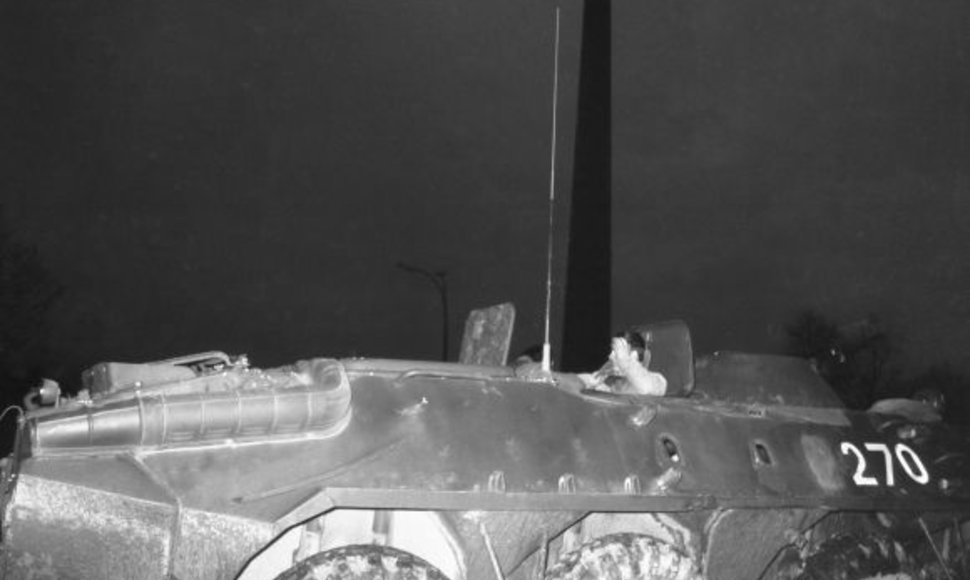"The mandate is formulated very clearly – to prepare our negotiation position for negotiations with Russia," Prime Minister Andrius Kubilius told journalists following a Cabinet meeting on Wednesday.
In his words, the negotiation position was a significant and necessary thing, and new dialogue with Russia was needed.
"I hope the Russian side with its new leadership, with its new government and re-elected President Vladimir Putin will take a new step on the road of evaluation of its history. (..) Every country taking steps on its road of democracy, strengthening its democratic institutions, its democratic mentality should obviously have a very open attitude to it history," the Lithuanian prime minister said.
Meanwhile opposition representatives say the conservative government is only imitating implementation of a Soviet occupation law adopted 12 years ago with less than six month remaining until general elections.
"It's an obvious proof the government has give no thought to the law over the last four years," social democrat Vytenis Andriukaitis told BNS on Wednesday.
"I see it as pure politicizing and pre-electional campaigning and attempts to use state resources for cheap campaigning," Valentinas Mazuronis of the Order and Justice party told BNS.
The parliamentary elections are scheduled for 14 October. The election campaign has already started.
According to Andriukaitis, the Law on Compensation of Damage Resulting from the Occupation By the USSR was adopted in 2000, in the conservative-dominated parliament with only their votes.
"It was adopted as a trap for future governments to be able to shout that they do nothing on this issue. Now the conservatives are fortunate to have been given the chance to implement it themselves. When we started criticizing that they did nothing on this issue, that they had no instruments to implement the law, they started imitating activity ahead of the 14 June (the Day of Mourning and Hope, commemorating Soviet deportations) to justify their inactivity in the eyes of their voters, and covering up the fact that the law is in fact futile," Andriukaitis, member of the Seimas Committee on Foreign Affairs, said.
Meanwhile Mazuronis underlined that such issues could not be solved unilaterally and negotiations and agreement were needed with the other side – Russia.
According to the plan, the panel will he headed by Teresė Birutė Burauskaitė, director general of the Genocide and Resistance Research Center.
The commission should include nine members representing the Union of Political Prisoners and Deportees, historians, archivists, the International Commission for the Assessment of Crimes of Nazi and Soviet Occupational Regimes and the Justice Ministry, officials of ministries of Foreign Affairs and Culture.
A deadline of 14 June is set for the commission to submit proposals to the government about damages caused to Lithuania by the former Soviet Union in 1940-1991 and by the Russian army in 1991-1993.
Russia has refused to address the matter, while Moscow officials sometimes issue statements denying the occupation of the Baltic states.
Lithuania raised the compensation issue immediately after declaring independence in 1990.
In June 2000, the parliament passed a law on compensation of Soviet damages. However, no steps have been taken to put the law into practice.
In a bilateral treaty signed in 1991, Russia acknowledged 1940 annexation of Lithuania, which affected the country's sovereignty.
The Soviet Union occupied Lithuania in 1940 by sending over 150,000 troops of the Red Army into the country. In 1941-1944, Lithuania was under Nazi Germany rule, followed by the second Soviet occupation that lasted until 1990.
Some 444,000 Lithuanian residents repatriated or fled Lithuania between 1940 and 1952, 275,000 were taken to labor camps or deported. About 25,000 people were killed in fighting, in addition to more than 20,000 participants and supporters of resistance efforts.
Naive to expect direct talks with Russia
Teresė Birutė Burauskaitė, chairwoman of the Lithuanian governmental commission for compensation of damage caused by the Soviet occupation, said on Wednesday it would be naive to expect direct talks with Russia on compensation of the Soviet occupation damage. But Lithuania needs to be well-prepared.
"I would say it would be naive for us to expect direct compensation talks. Our goal is to professionally prepare all documents, in a competent way and based on the international law postulates," Burauskaitė told in an interview to BNS on Wednesday.
"If we had professionally and argumentatively prepared material, then our diplomats would be able to put this trump card once they have the chance. It would be always in the possession of our diplomats," she said.
Burauskaitė also added that the damage should have a financial expression, and the commission would employ experts from the outside.
"I believe the evaluation would be turned into money. Based on the draft resolution, the commission will employ experts, professionals, and it will be necessary. The commission can provide information on damage estimates, but professionals have to find methods," she said.
Burauskaitė also underlined that a lot of work had already been done in calculating the Soviet occupation damage.














